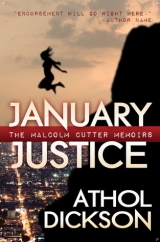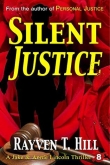
Текст книги "January Justice"
Автор книги: Athol Dickson
Жанр:
Криминальные детективы
сообщить о нарушении
Текущая страница: 24 (всего у книги 24 страниц)
50
I cut Olivia down and helped her to one of the cots, where she sat stoically while I did my best to tend to her hands and neck, staunching the blood flow with paper towels, which I secured in place with the same duct tape they had used to bind her to the ladder.
“She never meant to leave us,” said Olivia.
“No,” I said, “she never did.”
“She only wanted justice for her family.”
I said, “Yes.”
Olivia sat perfectly still as tears flowed from her eyes.
I wanted to hold her, but across the room, Medallion began to moan. I went to him. He had lost a lot of blood. There was no fight left in him, and very little hope. A gut wound like his had to be treated almost immediately, but there was no cell-phone service that high in the mountains, and no way for me to get him to a hospital in less than an hour. Still, I did my best, rolling him onto his side, cutting away his shirt, and using it to press into the ugly exit wound to try to stanch the blood. As I had with Olivia, I used the tape to hold the shirt in place. Since the entrance wound in front was barely bleeding, I spent no time on that.
I removed his wallet and found his DEA identification card. His name was Donald Ortiz. I searched his front pockets and found the keys to the Navigator. I also found the little computer chip he had removed from the patrol car, which contained the video of him and his partner murdering the two patrolmen.
I leaned close to his ear and said, “Ortiz? Can you hear me?”
His eyes didn’t open, but he nodded slightly.
“I’m doing my best for you, but I need to know something. Can you still hear me?”
Again, a little nod.
“The bomb,” I said. “Did you guys contract with Jawarski for the bomb?”
At first I thought he had lost consciousness, but then I saw his lips were moving. I leaned closer. His voice was a mere whisper. “What bomb?”
I sat back and wondered how much Doña Elena had promised the two agents, what it took to turn them. Had it been only money, or had she also offered them what millions of men had lusted for on the silver screen?
I took his empty holster and clipped it to my belt beside my own weapon. I said, “Ortiz. I’ll send help as fast as I can.”
I helped Olivia stand up. On the way out the door, I picked up Ortiz’s M9, slipped the safety on, and put it in the holster. I also took a roll of tape.
Outside in the rain, Olivia was as tough as any marine. She walked down the hill under her own power. She held her hands up at chest height to reduce the bleeding. She never complained and never used me for support.
I paused at the boulder where I had hidden the other agent’s gun. I removed it and stuck it in my hip pocket. So I had two M9s and an M11 on me. A walking arsenal.
When we reached the side trail up to the ledge where I had left Nunez, I asked Olivia to wait. I climbed up and found him lying exactly as he was before, totally drenched and still unconscious. It was hard to believe, but only thirty minutes had passed.
I used the tape to further secure his hands and feet, and I left him there. It crossed my mind that he might have a problem with coyotes, but I couldn’t carry him, and I really didn’t care.
We got to the Navigator and drove down off the mountain.
As soon as I had a cell-phone signal, I called Harper. Of course, the LAPD had called him after I gave them his name, so he already knew the Venice situation. I explained my side of things, told him I had video to prove I hadn’t killed the two policemen, and arranged to surrender myself to him at the Kaiser Permanente emergency room on the 5, which was the closest hospital to the Ortega Highway. In case the word of my innocence didn’t get out fast enough, I asked him not to notify the LAPD until I was already in his custody. He agreed my chances of surviving the arrest would be much better that way.
I spent most of the next three days in various interrogation rooms in Orange County and LA. One does not witness the murder of two policemen, assault two DEA agents, and kill a US congressman’s wife without spending a few days answering the same questions over and over. Teru showed up about two hours into the first round of interrogation, announced he was my attorney, and demanded to be present during questioning.
Even with the patrol car’s dashboard video, and even with Teru at my side, it did not look good at first. I was already under indictment for the home invasion at Doña Elena’s place, and Olivia Delarosa admitted she had been working for Doña Elena while using an assumed name. Now the woman whose home I had allegedly invaded, the woman Olivia had deceived, the woman Olivia’s mother had allegedly kidnapped, was dead by my hand, and Olivia was the only living witness.
But the ballistics on the bullets they took out of the two dead policemen matched the sidearms registered to Nuñez and Ortiz, and the video from the patrol car’s dashboard camera was indeed conclusive. Forensics also confirmed the only fingerprints on the knife found alongside Doña Elena’s body were hers, and Detective Russo verified that the wounds to Olivia’s hands were virtually identical to those that had been found on the corpse of Arturo Toledo seven years before, a fact that had never been released to the press.
Thanks to my conversation in the limo with Sid Gold about money laundering, I suggested that deposits for the sales from Doña Elena’s book should be compared to withdrawals from the numbered account Olivia had discovered. That was done, and although it caused him great trepidation, the Los Angeles district attorney eventually found enough political courage to announce that Congressman Montes’s wife had been laundering money through her self-publishing enterprise, blood money that had apparently been stolen from the Guatemalan people by her first husband, Arturo Toledo, whom she was now suspected to have murdered.
Special Agent Ortiz was dead when the authorities reached the cabin that night, but Special Agent Nunez was alive, untouched by the coyotes and screaming for help. After being told that charges wouldn’t be filed against me, and after negotiating a plea bargain, Nunez admitted he and Ortiz had met Doña Elena when they were detailed to Congressman Montes’s task force on the war on drugs in Guatemala.
Through contacts in Pico-Union, Doña Elena had learned that Valentín Vega was in town looking for a way to prove the URNG was innocent in the matter of Arturo Toledo’s murder. Of course she knew if they had been successful, it might well have given fresh momentum to the cold case, so she had paid the two DEA agents handsomely to discourage such an investigation.
They had been following Vega and Castro for about a week when I blundered into the picture. When I didn’t stop investigating after their first warning, and when the murder attempt in the mountains failed, they had decided to kill Castro and frame me and the URNG for the home invasion. With all his nosing around, Castro was probably onto them by that time, so it solved that problem for them too.
Under pressure from leaders in his own political party, Congressman Hector Montes stepped down as chairman of the Congressional Caucus on Central America. One week after that, I received a cashier’s check from a Guatemalan bank for twenty thousand dollars. With it came a handwritten note that said only, “Gracias. V.V.”
They used dogs to find Alejandra Delarosa’s skeletal remains. They found her at the bottom of a crevasse in a pile of boulders about one hundred yards up the mountainside behind the shack. Because the crevasse was so deep, no large animals had managed to disturb the body. That seemed to be a comfort to Olivia.
It may have been a disappointment to the Guatemalans of Pico-Union to learn that the donations they believed had come from La Alejandra had actually come from Arturo Toledo’s wife in an effort to make it look like Alejandra Delarosa was alive. But the story of Alejandra’s ultimate sacrifice in pursuit of justice for her people soon overshadowed that.
An artist in Laguna Beach created an iconic image from a photograph taken of her as a young woman. The image was reproduced on thousands of websites, T-shirts, and bumper stickers above the word “Justicia.” Throughout the Latin American world, Alejandra Delarosa became a symbol of the struggle against tyranny.
During the next three months, Olivia made frequent calls to me from Guatemala, where she had gone to accompany her mother’s remains for burial and stay with her father. She told me the news of his wife’s death had somehow snapped Emilio Delarosa out of his seven-year-long lethargy. He had stopped drinking. He had moved to a better apartment. He had begun considering his career again. I reminded Olivia how she had once told me she would rather be orphaned than deliberately abandoned. We agreed her father had probably felt the same.
There was some controversy about the disposition of the nine and a half million dollars that remained in Olivia’s numbered Swiss bank account. At first the Guatemalan government had attempted to convince the Swiss authorities that the money rightfully belonged to them. Public outcry was so universal all around the world that the Swiss government announced the money would be deposited with a nongovernmental organization serving families of the disappeared in the city of Cobán.
One day, about a month after Olivia went to Guatemala, I decided to paint again. I didn’t finish the canvas that had been in progress when Haley was killed. I put that one aside. But I did start a new series, images of Newport Harbor, and I spent as much free time as possible at my easel working en plein air around the grounds. Sid Gold seemed to think it was amusing that a bodyguard might love to paint. He teased me about it now and then. Then one day he saw my work, and I noticed that the teasing mostly stopped.
One afternoon I stood at my easel painting out beside the harbor seawall. Simon sat on a wicker chair a few feet away from me. Beside him on a small wicker table was a cup of tea. He was wearing a Montecristi Panama hat with a plain black band, a pair of pleated white linen slacks, a white cotton oxford shirt, and a navy blazer. He was reading my copy of Percy’s The Last Gentleman. I thought the title suited him. Just behind us Teru was on his knees beside a nearby bed, planting impatiens as pipe smoke hovered over him like a guardian angel.
My cell phone rang. Normally I didn’t take calls while I painted, but I glanced at the phone anyway.
“It’s Olivia,” I said.
Simon looked up from his Percy, smiled, and went back to reading.
I set the brush down on the easel tray, wiped my hands on a rag, and answered.
After the usual hellos, she said, “What are you doing?”
I told her I was painting a sloop on the harbor.
“That’s good,” she said. “I like to think of you that way.”
“And you? What are you doing?” I asked.
“I’m sitting on the balcony, drinking tea and looking at volcanoes.”
“Nice. How’s your father?”
“Actually, I have some news about him.”
“Good news, I hope.”
“Pretty good, yes. You heard about the group that’s coordinating the return of everybody’s money?”
“Sure.”
“They announced the fund manager’s name this morning. It’s Papa.”
“That’s wonderful. He must be doing a lot better.”
“He still has his moments, but this position is exactly what he needs. A chance to finish what my mother started.”
“You sound a lot better, Olivia.”
“You, too.”
“Do I?”
I looked around at the harbor, the mansion, the helipad, the tennis courts, swimming pool, and guesthouse, just a fraction of what Haley had left to me. I still thought of it as hers. All of it. I always would, because the only reward I could accept for loving Haley was loving Haley. So if I was any better, it wasn’t because of the money and the things. I would gladly give up everything to bring Haley’s murderer to justice. But in the months since January there had been no new leads. Haley’s Guatemalan motion picture project, the awful smell I had remembered, and the bomb maker, Jawarski, with his snapshot of me and Haley, had all come to nothing. Every lead had been investigated, and my memories of that night were still vague and untrustworthy. All I could do was wait and hope for something new to break.
But something had happened to me that night in the mountains. I had risked my life to save Olivia, not because my life no longer mattered to me, and not even because Olivia’s life mattered more than mine, but because I had finally remembered that life itself still mattered. I looked over at Teru planting, and Simon reading, and I thought it was good to remember that life had its own value, a value independent of my circumstances. It was good to have something worth fighting for. So I cocked my shoulder up to hold the phone against my ear and went back to painting, and yes, maybe I was a little better.
Then Olivia said, “Malcolm?”
“Mmm?”
“I’ve been thinking.”
“Of course you have. That’s what geniuses do.”
“I’m serious. Now that Papa’s so much better, I think I’ll come home.”
I added a bit of white to the sloop’s bow wave. “Makes sense.”
“So you think it’s a good idea?”
“If your dad’s okay with it, you bet.”
“I’ll have to get a job. You know anyone who needs a personal assistant?”
“Nobody you’d want to work for.”
“I thought maybe with your contacts in the movie business…”
“Most of them are jerks, Olivia. Trust me, you don’t want to work in that business.”
“Oh. I see.” The disappointment in her voice was obvious.
I said, “Hang on a minute, will you?” and I covered the phone with one hand and looked over at Simon and Teru. Both of them were watching me. We had discussed Olivia before, what we would do if she decided to come back. I said, “She’s asking about work. You guys sure?”
“You bet,” said Teru, and Simon said, “I am indeed.”
“Okay.” I put the phone back to my ear. “Olivia?”
“I’m here.”
“Listen, about that job, I do have a thought.”
“Yeah?”
“Simon was telling me just the other day he wishes we had a full-time handyman around the place. Then we decided maybe what he really needs is a handywoman. Plus, now that I’m driving more than I was, we need someone to take care of the cars. Especially since Teru went and bought that clunker of a Porsche.”
Over at the flower bed, Teru made a big show of turning his back on me to give attention to the flowers. Simon and I grinned.
“Seriously?” said, Olivia. “You think I could get hired there?”
“I do, yeah.”
“That would be amazing, Malcolm. I was thinking of coming back next Monday. Could you maybe set up an interview with your boss on Tuesday or Wednesday?”
Watching boats out on the harbor while the girl in Guatemala watched volcanoes, I said, “Well, about my boss… Can you keep a secret?”
Critics have favorably compared Athol Dickson’s work to such diverse authors as Octavia Butler (Publisher's Weekly), Hermann Hesse (The New York Journal of Books) and Flannery O'Connor (The New York Times). One of his novels is an Audie Award winner and three have won Christy Awards. His next novel is Free Fall in February, the second installment in The Malcolm Cutter Memoirs, coming in June, 2013.
Athol lives with his wife in southern California. Please visit his website at www.AtholDickson.com, and like his Facebook fan page.
Crazy Cutter will be back next summer
They say only a lunatic would go against the mob. That makes Malcolm Cutter the right man for the job. After all, he’s only been out of the mental hospital for a few months when the cops tell Fanny Gold her son was lost at sea. Fanny doesn’t buy it, so Cutter takes the case. Things turn nasty when the godfather of Los Angeles warns Cutter to back off, because Cutter never backed off in his life. Now the question is, will Hollywood’s favorite billionaire chauffeur and private investigator lose his mind, find the boy, or end up sleeping with the fishes?










